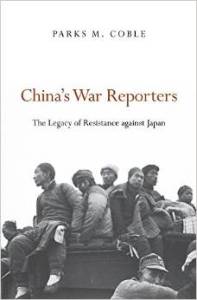China’s War Reporters: The Legacy of Resistance against Japan
Posted: March 19th, 2015 | No Comments »Parks Coble’s China’s War Reporters is now out and looks interesting . Having looked at the foreign press in China at the period (and those Chinese who worked for foreign language publications), I’m keen to see this perspective….
When Japan invaded China in the summer of 1937, many Chinese journalists greeted the news with euphoria. For years, the Chinese press had urged Chiang Kai-shek to resist Tokyo’s aggressive overtures. This was the war they wanted, convinced that their countrymen would triumph.
Parks Coble recaptures the experiences of China’s war correspondents during the Sino-Japanese War of 1937–1945. He delves into the wartime writing of reporters connected with the National Salvation Movement—journalists such as Fan Changjiang, Jin Zhonghua, and Zou Taofen—who believed their mission was to inspire the masses through patriotic reporting. As the Japanese army moved from one stunning victory to the next, forcing Chiang’s government to retreat to the interior, newspaper reports often masked the extent of China’s defeats. Atrocities such as the Rape of Nanjing were played down in the press for fear of undercutting national morale.
By 1941, as political cohesion in China melted away, Chiang cracked down on leftist intellectuals, including journalists, many of whom fled to the Communist-held areas of the north. When the People’s Republic was established in 1949, some of these journalists were elevated to prominent positions. But in a bitter twist, all mention of their wartime writings disappeared. Mao Zedong emphasized the heroism of his own Communist Revolution, not the war effort led by his archrival Chiang. Denounced as enemies during the Cultural Revolution, once-prominent wartime journalists, including Fan, committed suicide. Only with the revival of Chinese nationalism in the reform era has their legacy been resurrected.

Leave a Reply